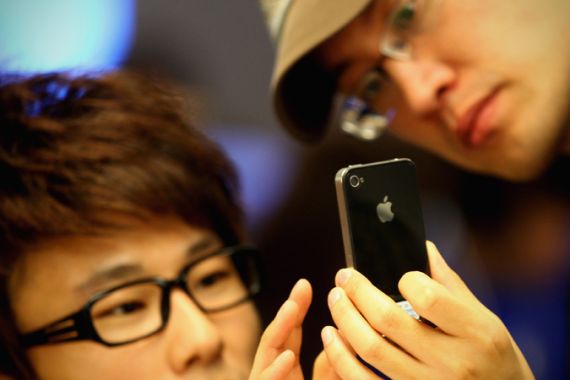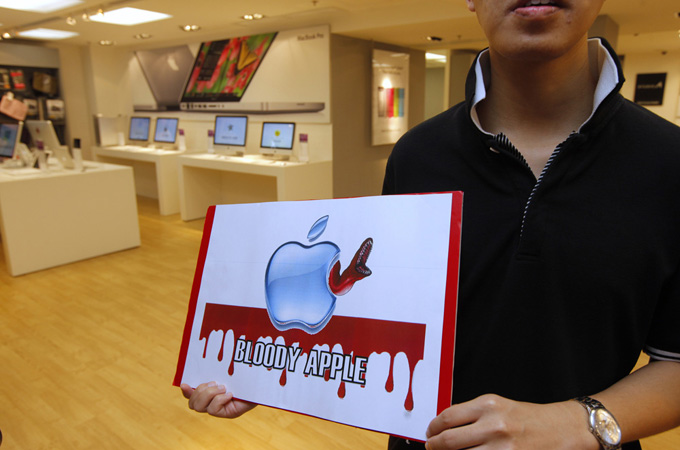
iPhone, iPad, iProtest
Does a dark secret lurk behind the sleek, shiny Apple products the Chinese seem so enamoured with?
 |
| For those familiar with conditions at China’s Foxconn factories, Apple’s shiny products have lost some of their sheen[EPA] |
This is the story of the battle against the maker of some of the most desirable gadgets on the planet.
Apple, the maker of the iPod, iPhone and iPad, now has bigger cash reserves than the US treasury.
Foxconn, the company building its gadgets in China, is the world’s largest manufacturer of electronic components and is accused of abusing its workers.
Here director Lynn Lee explains how Apple’s shiny gadgets have not looked the same since she met activist Debby Chan and made the film iProtest with fellow director James Leong.
| DIRECTOR’S STATEMENT: LYNN LEE |
I love my MacBook, cannot live without my iPhone and use Final Cut Pro on a regular basis. Sometime last year, I even contemplated getting an iPad. But then in May, James Leong and I met labour rights activist, Debby Chan, and Apple’s shiny gadgets have not looked the same since.
The first time I saw her, she was giving an impassioned speech in the middle of one of Hong Kong’s busiest streets. It was an unbearably muggy day. Most of the people who were out and about were more interested in shopping for electronic goods than in hearing a rant against one of their favourite brands. But Debby persisted and by the end of the afternoon, she and her fellow activists managed to collect several hundred signatures in support of their cause.
We Skyped and exchanged emails weeks before our first meeting. Debby always sounded busy and even slightly standoffish. It is easy to understand why. She was completing her investigations into Apple and its main supplier, Foxconn, and did not have time for nosy filmmakers who wanted to follow her and document her work. She emphasised repeatedly that we could do so only if we refrained from compromising any of her sources and promised not to embellish the facts. We agreed and a week after that protest in Hong Kong, she allowed us to go to China with her.
We had read about the troubles plaguing Foxconn in 2010 – the string of suicides, allegations of labour rights abuses, whispers of sweatshop-like conditions – and were eager to hear firsthand what the workers had to say. But nothing prepared us for what we encountered in Chengdu. Flying in, our journey was disrupted by bad weather and our plane had to be diverted to another airport. During the five-hour wait, we received news of an explosion at Foxconn’s iPad production facility in Chengdu. Online reports said there were many casualties. We wondered if any lives were lost.
The 36 hours that followed were frenetic: Touchdown in the early hours of the morning; a visit to the rain-soaked explosion site; futile attempts to speak to the hundreds of workers gathered outside the cordoned-off plant; a minor run-in with some security guards. Despite not having any sleep the night before, Debby was relentless. She was determined to find out what had happened.
And then we went to the public hospital, and things got a little hairy. The burns unit, where the victims of the explosion were being treated, was overflowing with people – grieving relatives, harried nurses and, behind half-drawn screens, we could see patients swathed in thick bandages. Down a corridor, a woman wailed as she berated doctors for failing to save her son.
We did not know it then, but the place was also full of government officials and our presence was quickly noted. As Debby attempted to talk to some of the victims’ relatives, police and security guards quickly surrounded her, demanding to know who she was. When she refused to answer, their response was swift. Three men attempted to drag her to a nearby ‘office’ for a ‘chat’. There was a scuffle, followed by a bizarre standoff. Debby backed herself up against a wall, sat down on the floor and screamed whenever anyone tried to pull her into the ‘office’. In the meantime, security guards blocked access to the lifts and stairwell. We were trapped, although it was not entirely clear why we were being detained. We remained stuck in the hospital for more than an hour before being abruptly told to get out.
We would learn later that three workers from the polishing unit died as a result of the explosion. Foxconn blames the disaster on aluminum dust in a ventilation duct. Debby and her fellow campaigners say the tragedy could have been averted.
Apple gadgets are known for their sleek design. But behind every smooth, shiny iPad, iPhone or MacBook Pro it seems, is a dust-coated Foxconn worker. Prior to the explosion in Chengdu, activists were already hearing complaints of sore throats and coughs caused by prolonged exposure to chemicals and dust particles. There is even video footage of a group of men from the polishing unit covered in a powdery grey substance. Asked what it was, one of them replied: “Aluminum dust.”
Debby says she alerted Foxconn to the problem in early May. The explosion happened some three weeks later.
It seems workers from the polishing unit are not the only ones at risk. Shortly before leaving for Chengdu airport, we met a Foxconn employee with a raspy voice and a swollen neck. She told us she regularly worked for more than 10 hours a day, and that fumes from chemicals used by her unit gave her a chronic throat infection.
“I’m always sick,” she said. “Making the iPad makes me sick.”
iProtest can be seen from Tuesday, September 20, at the following times GMT: Tuesday: 2230; Wednesday: 0930; Thursday: 0330; Friday: 1630; Saturday: 2230; Sunday: 0930; Monday: 0330; Tuesday: 1630. |
